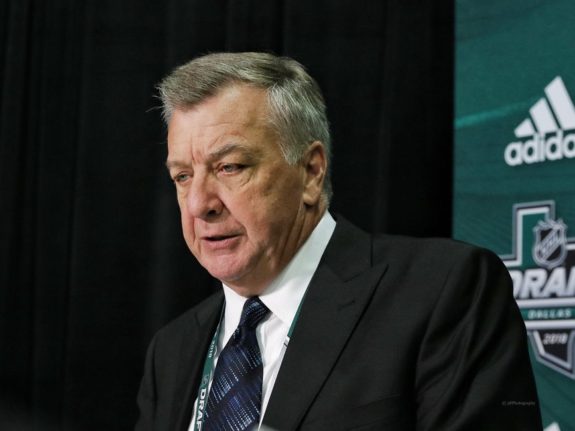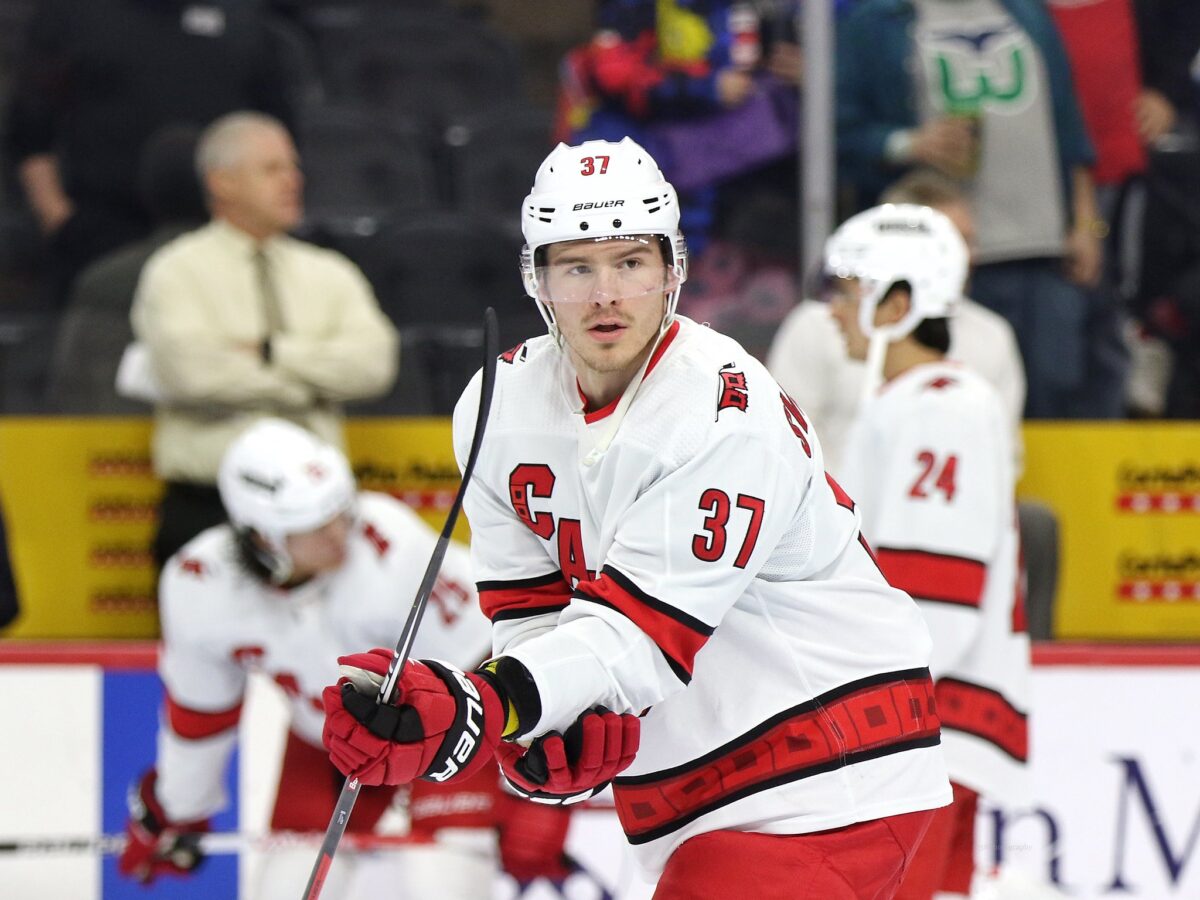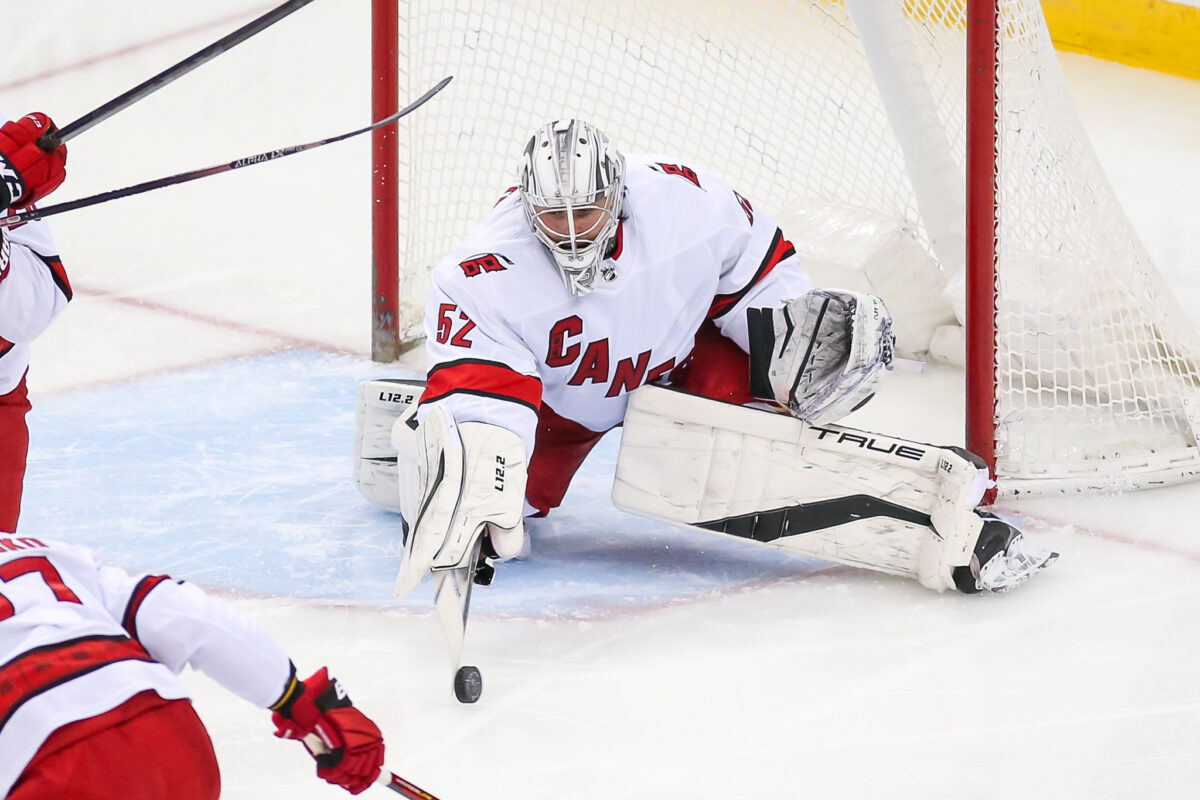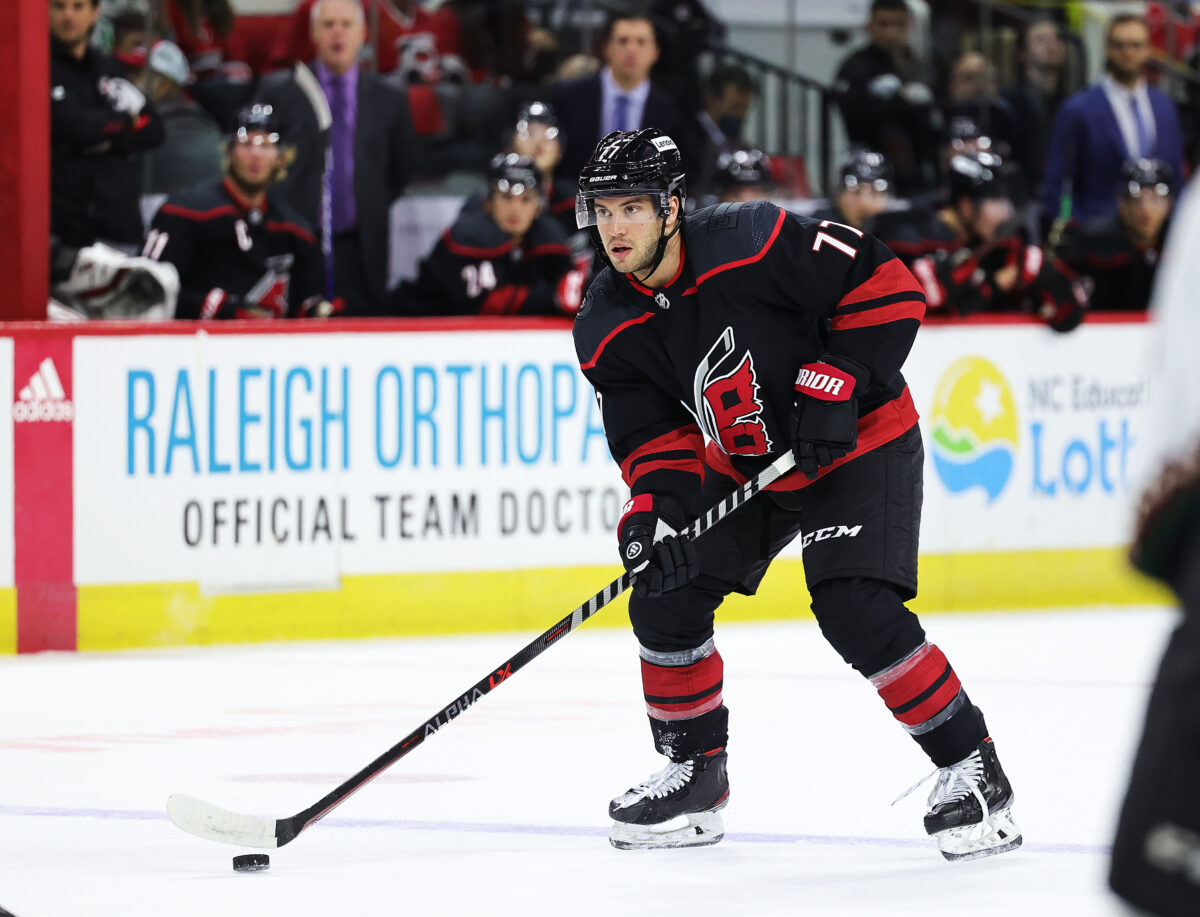When you play with fire, you’re liable to get burned. In the case of the Carolina Hurricanes, home earlier than hoped from the NHL postseason once again, that means letting a New York Rangers squad with impressive offensive firepower, a big, physical blue line tough to carve out space against, and, not to mention, the best goalie on the planet, back into a series after taking a commanding 2-0 lead.
The Hurricanes had the makings of a lineup that could win the whole darn thing. They were deep. Sebastian Aho and Andrei Svechnikov looked like stars for much of the season. They had a near-Vezina candidate in goal in Frederik Andersen. The blue line remained deep and talented. Sadly, it all came apart, brick by brick — starting with Andersen’s injury at the end of the regular season. After those things dissipated, they were left searching for the “why” after a Game 7 shellacking at the hands of the Rangers.
Today, we’ll try to answer some of that “why,” as we turn the page and begin looking towards the 2022-23 season. It seems every offseason has felt really important for the current regime, and this one seems to trump them all with the way their promise turned into despair. The expectations are different in Raleigh now, as this team has taken steps after each season to the point where anything short of a Stanley Cup, or at least an appearance in the Final, now feels like a significant letdown. The front office headed up by general manager Don Waddell must be aggressive in tightening up some key holes in the lineup, and these are three of the biggest ones that the Hurricanes’ front office’s 2022 summer will be judged upon.
The Hurricanes’ Offensive Offense Must Be Addressed
After the 2020-21 season, a pretty clear area of need was identified. That position was the goaltending, where the team never seemed to fully trust Alex Nedeljkovic and knew that Petr Mrazek and James Reimer weren’t the long-term answers — especially in a conference that kept seeing them bested by guys like Andrei Vasilevskiy and Tuukka Rask before him. Despite the confusion and hot takes about the decision to move on from their Calder candidate in Nedeljkovic, it’s safe to say those moves panned out. The Hurricanes ended up with one of the best tandems in all of hockey in 2021-22 with Andersen and Antti Raanta. This offseason needs to see the same kind of eagerness to solve their obvious shortcoming — the Hurricanes desperately need some more juice and finishing in their forward ranks.
It seemed this team had what it took most of the regular season. The depth scoring was a huge part of their success, as we’ve discussed on multiple occasions. Svechnikov took a big step, scoring 30 goals and 69 points. Aho continued his ascent as a star, first-line centerman and point-per-game player. Guys like Nino Niederreiter and Vincent Trocheck (although a bit inconsistent, in the latter case) provided some nice secondary skill in the middle-six, and rookie Seth Jarvis burst on the scene and provided a glimpse into what is undoubtedly and extremely bright future in this league.

Then, the playoffs happened. Fans can understand occasionally getting blanked by the Patrice Bergeron-led Boston Bruins. Certainly, they can understand Igor Shesterkin, one of the best goalies in recent memory, shutting them down a time or two, stealing a game or two in a tight playoff series. However, the lack of any real threats was highly apparent in the postseason overall, as the team failed time and again to produce when it mattered most or even really threaten to consistently put a crooked — or maybe even competitive — number on the scoreboard.
This isn’t to say there isn’t a significant amount of skill in the Hurricanes’ top-nine — there certainly is. However, there seems to be a somewhat redundant archetype and not enough of one of the most important skills that any team needs if they’re going to make a deep run: guys that can fill the net, that are a threat to score in any circumstance, not just when the perfect play or easy, grade-A chance comes to pass.
Goal scoring has been a bit of a question mark for a few years now. Svechnikov himself seemed a potential answer to this problem, as his power forward game, high-end release, and general skill level in tight spaces made him look like a future superstar. He still has that potential and is on that trajectory despite a subpar postseason, but he may not be the elite goal scorer many thought he could be. Jarvis may already be the best pure finisher on the team, but if you’re relying on a 20-year-old to be your best at anything, it may not be a great sign come playoff time. It seemed like the Hurricanes only really had offensive outbursts when they played a near-flawless game and were creating offense within the confines of their system, creating havoc and turnovers on the forecheck, and scoring greasy goals.
The problem was that those types of goals dried up against two tough, physical blue lines for Boston and New York. It’s unrealistic to expect to consistently dominate in that way during the playoffs no matter who you’re playing, really. So while those teams had guys like David Pastrnak and Mika Zibanejad, the types of players who are a threat to score the second they cross the blue line, the Hurricanes never really had an answer of their own who could create offense in the blink of an eye, seemingly out of nowhere.
Even beyond that, and perhaps the most alarming phenomenon, was the lack of the traits this franchise has been built on — work ethic, the willingness to do the little things it takes to win, and the high-flying speed that creates that aforementioned havoc on the forecheck and in the offensive zone. When the Hurricanes missed those things, the offense was flat-out bad. This is one of the more intriguing parts of this issue, frankly; there are too many players that were passengers in the postseason, and, without naming names, some of them are up for free agency this summer.

It’ll be fascinating to see if the front office deems them worthy of new deals or if that cap space is better allocated in other ways. Few players are going to produce every night, or every week even, but there’s a difference between struggling to put the puck in the net and not carrying your weight on the 200-foot surface in any way. There are players on the team that, when they aren’t scoring points, aren’t just unhelpful, they’re straight up detrimental. Coach Rod Brind’Amour doesn’t seem like the type of coach that’s going to just roll with that sort of thing.
The offseason obviously hasn’t started in earnest, and thus, there’s no reason to waste time listing names about potential fits (although yes, I agree, unrestricted-free-agent-to-be Filip Forsberg would look awfully good in red, as a few of you have pointed out to me on Twitter). There will be plenty of time in the coming months for Waddell and company to think about it. At the end of the day, though, there has to be more finishing in Raleigh next season if this team wants to truly make the next step and compete for a Stanley Cup, especially since goalies like Shesterkin and Vasilevskiy will not be going anywhere for the foreseeable future. The lack of goal-scoring ability will be a non-starter in the Eastern Conference playoffs for the next half-decade, at the least.
What Do Hurricanes Do in Net?
With both Raanta and Andersen signed through next season, the answer could easily be “nothing” to this one. After all, Pyotr Kochetkov will still only be 23 years old, having played a little over 20 games since coming to North America in mid-February. There’s certainly an argument to be made that he can spend some or all of next season in the American Hockey League (AHL), especially after he had some moments in the postseason where he was in over his head. Granted, with all those circumstances about his situation, being the young, inexperienced goalie, and thrown in cold in pretty big moments, it’s hard to be too critical of those performances — especially considering they mostly came in games where the Hurricanes did not look good at all (his Game 2 win over the Bruins being the obvious outlier).
Plus, let’s face it; we just saw that the book on the two NHL goalies was, in fact, true. Injuries have always been their biggest issue, and you wouldn’t have to squint hard to envision a scenario where Kochetkov still ends up getting a significant amount of starts with the big club even if both are retained. If anything, the Hurricanes were probably fortunate as far as injury luck was concerned in net in 2021-22, with Andersen and Raanta combining to start all but six of their 96 games. I doubt many would have made that bet ahead of the season. Still, with how good Andersen was in the regular season, plus Raanta’s incredible postseason performance, there are numerous reasons to keep the status quo.

Nonetheless, with his impressive performance with the Chicago Wolves of the AHL, his flashes of greatness while in the NHL, and overall combination of size, athleticism, and fire, a glimpse was provided as to why the organization is so high on Kochetkov. He had his struggles that any young goalie is liable to have (remember, Shesterkin himself was put in a playoff game as a rookie against the Hurricanes and had some goals that he wouldn’t be expected to give up today, and he was two years older than Kochetkov at the time). But when deciding which direction to go in the 2022-23 season, what’s best for the goalie of the future should be topped in priority only by which goaltender gives the Hurricanes the best chance to win in the Stanley Cup in the immediate future.
Related: 4 Hurricanes Who Likely Won’t Return For 2022-23
There’s definitely a scenario where Kochetkov is one of those two goalies, though. There’s still some risk involved in sticking with their tandem of last year, as Andersen will be 33 when the season begins, the same age Raanta hit in early May. There are no guarantees that either goalie replicates the season they just had if they do stay healthy, even with the excellent blue line that the Hurricanes are sure to ice next season once again. Then there’s the question of whether the AHL is even enough of a challenge for Kochetkov to really push his development and get the most out of him. That’s a question the coaches and front office will have to answer, as getting him to reach his sky-high potential is paramount.
Regardless of the direction they go, all three of these guys may see time with the Hurricanes next year, and it’s tough to say any potential choice is wrong (short of sending both the veterans out or something wild like that). It wasn’t that long ago that the Hurricanes would have killed for one decent NHL goalie, and now they have three candidates that all bring different styles and attributes to the table. Be it the steady presence of Andersen, the scrappy, veteran journeyman with the inspiring story in Raanta, or the highly-talented youngster in Kochetkov, who brings the promise of the future alongside his immense talent. The team is in good hands between the pipes moving forward, regardless, but it’s going to be really exciting to see the day when they fully hand the keys to the kid. Who knows, it could be sooner than you think.
The Power Play and Its Quarterback
Now, obviously, this and the “offense” section above go hand in hand to a degree. If they can add a little more finishing and some higher-end offensive players, these two will improve simultaneously. Still, it feels like there are some pretty big questions that need answering on the back end, and one of the storylines will be what comes of the Tony DeAngelo situation over the summer. For what’s it’s worth, early suggestions seem to be that both team and player are interested in a reunion, meaning an extension could be forthcoming (from ‘Will Hurricanes, polarizing defenseman Tony DeAngelo extend relationship? What they said’, The News & Observer, June 3, 2022).
For a $1 million signing, you can’t ask for more than what the Hurricanes got from the talented offensive defenseman. A since-relocation record for assists, 10 goals, a great first-round series against Boston, and, for the most part, good power play quarterbacking while spending most of the year on the top pairing alongside Jaccob Slavin is not the type of production you can ordinarily bargain-bin shop for. Alas, DeAngelo wasn’t an ordinary situation, but regardless of how you feel about him, with his successful re-implementation into the league, he’s earned himself a solid raise. He’s also a restricted free agent, meaning the Hurricanes can sign him to a qualifying offer as a little insurance in case they either don’t choose to re-sign him or he has priced himself out of town.
This is a double-edged sword. If you re-sign DeAngelo and he’s asking for at least something resembling the market rate for a player of his caliber — a totally understandable business decision, as there’s only a finite amount of time one can play in this league, and for the relatively short amount of time he’s been in the league for a 26-year-old, he’s obviously got to think about his future. If they bite the bullet and re-sign him to a $5 million deal (still probably a discount for his talent and production), it eats up a lot of that cap space that they could be using on item number one in this post.

Then again, after what we just saw from the Hurricanes in the second half of the season and playoffs, it’d be a very, very tough sell to the fanbase (and the locker room, for that matter) to let one of your best power-play performers walk. Sure, you can use that cap space to bring in a big offensive fish, but then they’re also opening another hole on the back end. You have to have someone to quarterback your power play, to command the puck movement and keep the flow going. That’s not something DeAngelo did particularly well as the unit fell apart late in the season, but it still feels like risky business to simply let him walk or go to a backup plan that may not mesh as well as he did early in the season. The potential is still there for him to be a huge part of next year’s team. They just have to be careful with the dollars.
It’s not just personnel, though, as the system was pretty abysmal. Former Hurricane Jeff Daniels runs the forwards and power play for the team, and a lot of fans have already been calling for his head after the ineffectiveness that came to be. Perhaps the team moves on; it’s probably not the worst idea in the world. The unit got far too predictable. They basically had no threat along the goal line, so it was just passing back and forth amongst the trio atop the hybrid umbrella the Hurricanes used, one-time it as soon as you think the penalty killers were leaning to one side… right into that weakside defenders’ shin pads, who barely had to move to defend it. The puck retrieval then usually wasn’t good enough, the opponent would clear, and you’re having to go 200 feet once again. Pretty frustrating.
Not only that, but how stationary those guys usually were meant that nobody low or on the weak side was cutting for a seam pass or generally making it difficult on the penalty killers to stay in lanes and track both the opposite-side forwards and the puck simultaneously. The lack of stress they’d put on their opponents usually didn’t even make them break a sweat, as they could stay in one spot, keep their stick in the middle passing lane, and force bad shots from the outside. Oh, usually un-screened shots, too, by the way, if it happened to somehow get through, which was obviously rare. This must be the top priority this offseason; not only finding a little more “oomph” to generate offense more consistently but also finding and implementing the system that fixes the power play. It can’t get them eliminated from the playoffs again.
Carolina Must Sit With the Sting and Let it Fuel Them
This was a tough one to swallow. Fans are likely frustrated with the way it ended, or at the very least disappointed to see a team with so much potential end at about the same spot it has in the last few years. There’s some solace to be taken in the fact that they were competitive against their eliminator, as that was not the case in those prior postseasons, running into a much better Tampa Bay Lightning squad in 2021 and a much better Bruins squad the two years preceding that. There is no doubt the players are frustrated themselves, and no one better showed that than Jordan Staal in his Game 7 postgame presser, where he was as emotional as anyone around here has seen him since his 2012 arrival.
It’ll be even worse if the Rangers are able to finish the job against the Lightning, because the Hurricanes know that was a team they could have beaten. They’ll know it could have easily been them heading to the Final, and there they’d either have faced the Edmonton Oilers, who they always seem to shut down (largely because Jaccob Slavin is insanely good), or the Colorado Avalanche, who play a very similar style to the Hurricanes and another team they have shown they can beat in recent years. Those were regular season games, and, yes, ultimately meaningless, but these thoughts could and likely will be on the minds of the Hurricanes as the rest of the postseason progresses.
Alas, ifs and buts get you nowhere. Instead of considering what could have been, this needs to drive the team back to the roots on which it’s been built under Brind’Amour: work, intensity, and the classic “grit and grind.” The team is going to have a long summer to sit around and stew on this failure. The loss needs to push them to new heights in those aforementioned categories, even to levels they’ve yet to find in their beloved head coach’s four years at the helm. Next year, nobody should be surprised if a hungry — even angry — team is ready to show they’re not the squad that failed to show up in a massive Game 7 comes out of the gates ready to send a message to the league.
With so many players up for free agency and the potential for a little breathing room as far as salary cap goes, a highly-intriguing offseason is in store in Raleigh. Don’t be surprised if the shakeup is bigger than expected after yet another second-round exit. Everyone around the team is sure to be frustrated but hopefully motivated too. So, if the Hurricanes’ front office can find the right answers to these question marks during the blistering North Carolina summer, this loss could very well be looked back upon as not a downfall but a turning point, where needs became clear, the right buttons were pushed, where a young team turned into seasoned vets that learned what it took to win when the games get tightest.